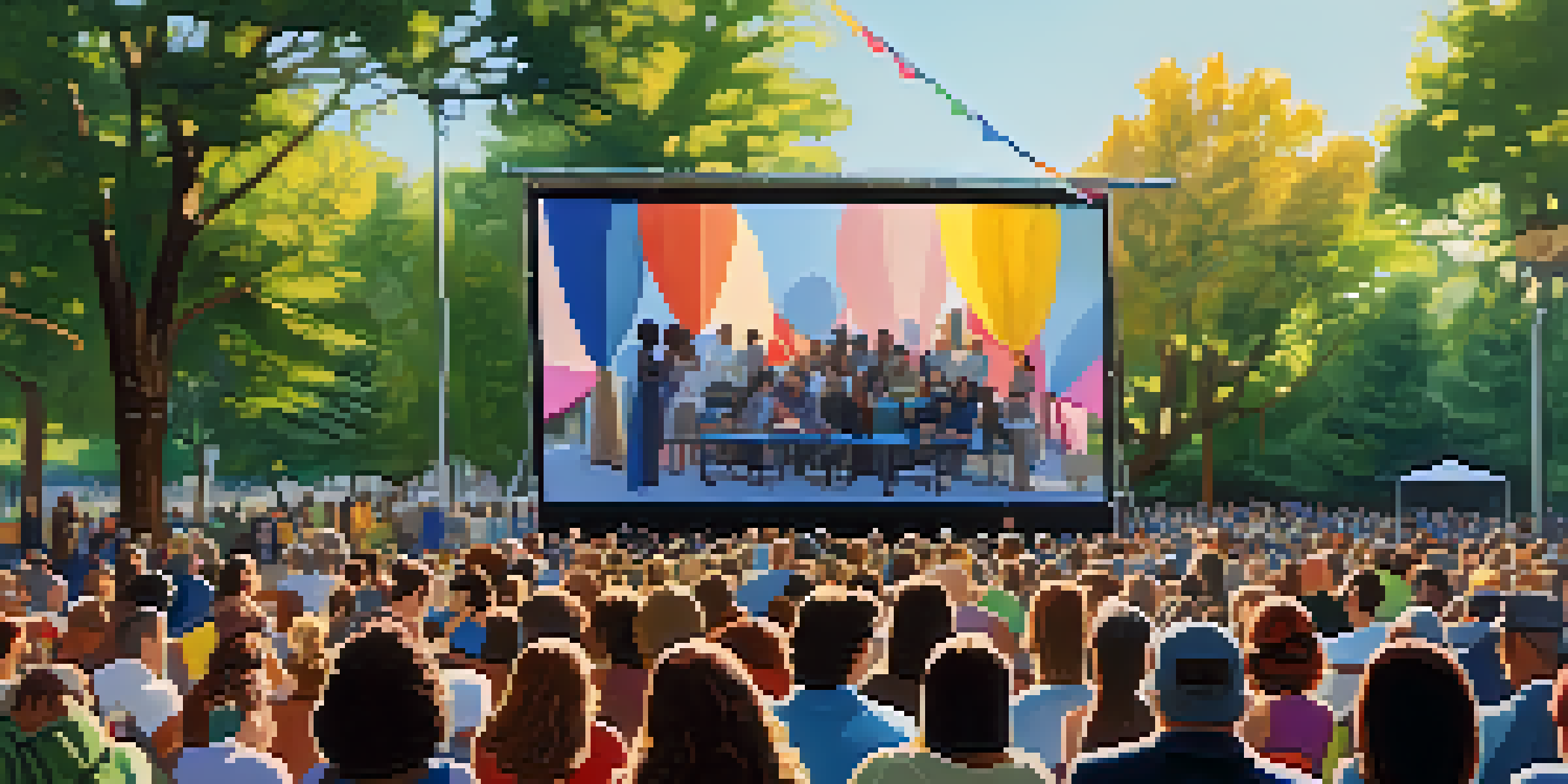The Role of Activism in Shaping Diversity in Hollywood

Understanding Activism in the Context of Hollywood
Activism in Hollywood has taken many forms, from grassroots movements to high-profile campaigns. At its core, activism seeks to challenge the status quo and advocate for change, often focusing on social justice and representation issues. In the film industry, this means amplifying voices that have historically been marginalized, such as women, people of color, and LGBTQ+ individuals. By pushing for inclusivity, activists aim to create a more authentic reflection of society on screen.
Diversity is being invited to the party; inclusion is being asked to dance.
Consider the #OscarsSoWhite movement, which highlighted the lack of diversity among Oscar nominees. This campaign sparked conversations and prompted industry-wide changes, leading to new initiatives aimed at increasing diversity in nominations and hiring practices. Activists leverage social media platforms to raise awareness and mobilize support, making their voices heard in ways that resonate far beyond Hollywood's walls.
Ultimately, activism acts as a catalyst for change, influencing not just the content we see but also the people creating it. As audiences demand more diverse stories, filmmakers are starting to respond, reflecting a broader spectrum of experiences and identities. This shift not only enriches the storytelling landscape but also helps dismantle harmful stereotypes perpetuated by a lack of representation.
The Rise of Diverse Storytelling in Film
In recent years, Hollywood has seen a notable rise in diverse storytelling, thanks in large part to activist efforts. Filmmakers are increasingly drawing inspiration from their own backgrounds, leading to narratives that resonate with underrepresented audiences. This evolution is not just a trend but a necessary step towards creating a more inclusive industry where everyone can see themselves reflected on screen.

Films like 'Black Panther' and 'Crazy Rich Asians' have shattered box office records while showcasing the richness of their respective cultures. These movies have proven that diverse stories are not only commercially viable but also crucial for cultural representation. By embracing varied perspectives, the industry is beginning to break free from the cookie-cutter narratives that have dominated for decades.
Activism Drives Change in Hollywood
Activism in Hollywood challenges traditional narratives by advocating for greater representation of marginalized voices.
Moreover, the success of these films has encouraged studios to invest in projects that prioritize diversity. This shift in focus is a direct result of activism and audience demand, showing that when voices are amplified, they can lead to tangible changes. As Hollywood continues to evolve, the call for diverse storytelling remains at the forefront, challenging filmmakers to push boundaries and explore new narratives.
The Role of Social Media in Activism
Social media has become a powerful tool for activists aiming to promote diversity in Hollywood. Platforms like Twitter and Instagram allow for real-time engagement and the ability to mobilize supporters quickly. Activists can share their messages widely, reaching audiences far beyond traditional media channels, which amplifies their impact on the industry.
The stories we tell are the stories we live. If we are not telling diverse stories, we are not living in a diverse world.
For instance, campaigns like #MeToo and #TimesUp have utilized social media to address issues of harassment and inequality in Hollywood. These movements gained momentum online, leading to significant changes in policies and practices across the industry. By creating a digital space for dialogue, social media has enabled activists to not only raise awareness but also hold powerful individuals accountable.
As activists harness the power of social media, they can challenge industry norms and push for increased representation. This has led to a growing recognition among executives that audiences are demanding more diverse content. The conversations sparked online are reshaping the narrative around who gets to tell stories in Hollywood, paving the way for future generations of filmmakers.
The Impact of Representation Behind the Camera
While on-screen representation is crucial, the importance of diversity behind the camera cannot be overstated. Directors, writers, and producers from diverse backgrounds bring unique perspectives that enrich storytelling. Activism has highlighted the need for greater inclusivity in all aspects of filmmaking, pushing studios to hire more women and people of color in creative roles.
When diverse voices are included in the creative process, the stories told are often more nuanced and authentic. For example, the success of films like 'The Farewell' illustrates how personal experiences can shape compelling narratives. By hiring individuals who have lived the stories being told, filmmakers can create work that resonates deeply with audiences.
Diverse Stories Gain Industry Support
Successful films featuring diverse perspectives have proven that inclusive storytelling is both commercially viable and culturally essential.
The push for diversity behind the camera is gaining momentum, with initiatives aimed at increasing opportunities for underrepresented talent. This shift not only leads to better storytelling but also fosters a more equitable industry. As more diverse creators rise to prominence, the landscape of Hollywood is gradually transforming, becoming a space that values inclusivity and creativity.
Challenges Faced by Activists in Hollywood
Despite the progress made, activists in Hollywood continue to face significant challenges. Resistance from traditional power structures can hinder efforts to promote diversity and inclusion. Many industry leaders are entrenched in old practices and may be reluctant to embrace change, fearing that it could compromise their established formulas for success.
Additionally, the perception of activism can vary among different audiences. While some view it as a necessary force for change, others may see it as overly aggressive or divisive. This dichotomy can create tension and complicate the dialogue around diversity, making it essential for activists to navigate these conversations thoughtfully.
Moreover, sustaining momentum in activism is a constant challenge. While social media can amplify voices quickly, it can also lead to fleeting attention on important issues. Activists must find ways to keep conversations alive, ensuring that diversity remains a priority rather than a passing trend. This ongoing struggle highlights the resilience required to effect meaningful change in Hollywood.
The Role of Film Festivals in Promoting Diversity
Film festivals play a vital role in promoting diversity and showcasing underrepresented voices. These events often serve as platforms for filmmakers from diverse backgrounds to present their work and connect with audiences. By highlighting films that might otherwise go unnoticed, festivals contribute to a more inclusive cinematic landscape.
For example, festivals like Sundance and Toronto International Film Festival have made concerted efforts to feature films by and about marginalized communities. This commitment not only provides visibility for these stories but also encourages industry stakeholders to recognize the value of diverse narratives. By celebrating diverse filmmaking, festivals help shift the conversation around representation in Hollywood.
Social Media Amplifies Activist Voices
Platforms like Twitter and Instagram enable activists to mobilize support and hold the industry accountable for diversity and inclusion.
Moreover, film festivals often foster collaborations and networking opportunities for underrepresented filmmakers. These connections can lead to future projects and help amplify diverse voices within the industry. As festivals continue to champion inclusivity, they play an essential role in shaping the future of Hollywood and ensuring that more stories are told.
The Future of Activism and Diversity in Hollywood
Looking ahead, the future of activism and diversity in Hollywood appears promising yet complex. As audiences continue to demand representation, the industry must adapt and evolve to meet these expectations. This shift presents both opportunities and challenges, requiring a commitment to long-term change rather than superficial adjustments.
Activists will likely continue to play a crucial role in pushing for accountability and inclusivity. By leveraging their platforms and advocating for diverse stories, they can help reshape the narrative around who is allowed to tell stories in Hollywood. This ongoing dialogue will be essential in ensuring that diversity remains a priority for the industry.

Ultimately, the success of these efforts will depend on collaboration among filmmakers, studios, and audiences. By working together, they can create a Hollywood that truly reflects the richness of the human experience. As activism continues to influence the industry, the hope is that diversity will become not just an aspiration but a defining characteristic of storytelling in Hollywood.